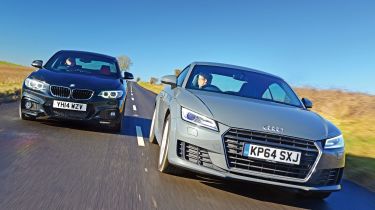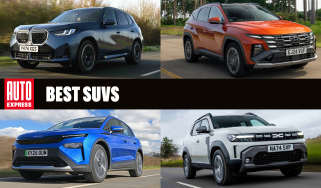Audi TT Ultra vs BMW 220d M Sport
Bold looks help Audi TT and BMW 2 Series stand out, but do diesel versions add up?
Image is everything in today’s fashion-led world of designer labels, and it’s design-focused cars like the latest Audi TT and BMW 2 Series that cater for this style-conscious market. Striking looks and neat proportions mean these compact coupés look good in pretty much every environment, but do small and sporty cars like these work with diesel engines?
Audi and BMW certainly believe that their stylish two-doors give drivers what they want: attractive design, plenty of performance and running costs on par with a family hatch. The 2 Series is the car the new TT has to beat, and the Audi has packed in some clever new technology that might just help it emerge on top.
So, to see if the TT Ultra could mount a meaningful attack on the BMW 220d, we took the German duo to the open roads of Chitterne in Wiltshire. Which is the better two-door all-rounder?
Click the links above to read individual reviews of the cars in this test, and scroll down to see which stylish coupe comes out on top...
Head-to-head
Design touches
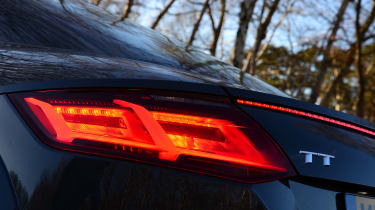
The TT leads the way in the style stakes thanks to some very neat design details. Its brake lights use Audi’s LED technology to create a distinctive signature, including the full-width brake light. Matrix LED headlamps are also available, although they’re far from cheap, at £2,375 extra. The 2 Series is well proportioned – especially in M Sport spec – but next to the sharp TT, its softer shape looks more conventional.
Optional extras
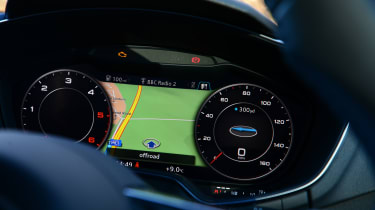
The temptation on cars like this is to improve their spec with some options, but be careful, as costs can quickly mount up. For example, sat-nav is a £1,795 extra on the TT, while cruise control is a £520 option on the BMW. Metallic paint is pricedat around £550 for both cars.
Boot space
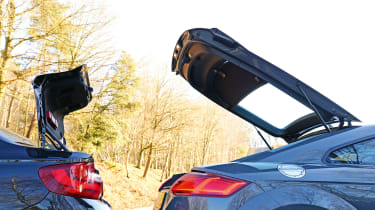
Both coupés have drawbacks when it comes to luggage space. Access to the Audi’s boot is easy, but the area is shallow. Unlike the BMW, you can fold the seats down to increase space, yet the 220d’s load bay is bigger and a better shape. Neither has a false floor, so no other storage is offered.
Verdict
1st place: Audi TT
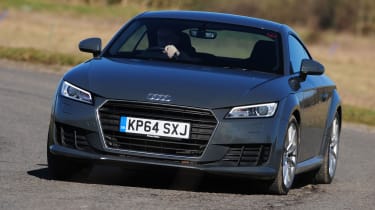
It’s difficult to pick a winner here, as both cars have their merits, but it’s the TT Ultra that takes the victory. Looks are a vital part of the equation in this class, and the Audi’s angular styling will turn more heads. It reinforces this with a composed and capable chassis that finally makes the TT a true match for its sporty persona. Add excellent residuals, lower company car tax bills and the new Virtual Cockpit, and the Audi edges it.
2nd place: BMW 2 Series
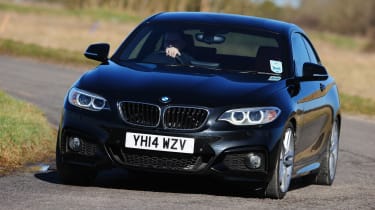
An involving chassis alone isn’t enough to win here. Although the BMW’s engine is smoother than the Audi’s, its more anonymous design means it blends into the background. The 220d’s residuals aren’t quite as strong as the TT’s, either, and it’ll cost more to tax. However, the 2 Series is a slightly more practical car. The level of standard kit on offer is fair, but it can’t match the Audi’s new hi-tech widescreen dash.
Used - available now

2018 Mercedes
GLA
30,844 milesAutomaticDiesel2.1L
Cash £18,277
2022 Vauxhall
Mokka
50,623 milesManualPetrol1.2L
Cash £14,790
2023 Ford
Focus
17,010 milesManualPetrol1.0L
Cash £16,995
2023 Kia
Sportage
9,623 milesAutomaticPetrol1.6L
Cash £27,189*The car in our pictures is a BMW 225d, but we test the £28,365 220d M Sport model in this test.
Key specs:
| Audi TT Ultra | BMW 220d M Sport | |
| On-the-road price/total as tested | £29,770/£34,385 | £28,365/£34,630 |
| Residual value (after 3yrs/30,000) | £16,281/54.7% | £13,723/48.4% |
| Depreciation | £13,489 | £14,642 |
| Annual tax liability std/higher rate | £1,257/£2,514 | £1,314/£2,628 |
| Annual fuel cost (12k/20k miles) | £1,630/£2,716 | £1,244/£2,073 |
| Ins. group/quote/road tax band/cost | 34/£400/B/£20 | 27/£396/C/£30 |
| Cost of 1st/2nd/3rd service | £17 per month (3yrs) | £425 (5yrs/50k miles) |
| Length/wheelbase | 4,177/2,505mm | 4,432/2,690mm |
| Height/width | 1,353/1,832mm | 1,418/1,774mm |
| Engine | 4cyl in-line/1,968cc | 4cyl in-line/1,995cc |
| Peak power | 181/3,500 bhp/rpm | 187/4,000 bhp/rpm |
| Peak torque | 380/1,750 Nm/rpm | 400/1,750 Nm/rpm |
| Transmission | 6-spd man/fwd | 6-spd man/rwd |
| Fuel tank capacity/spare wheel | 50 litres/sealant | 52 litres/sealant |
| Boot capacity (seats up/down) | 305/712 litres | 390/N/A litres |
| Kerbweight/payload/towing weight | 1,265/400kg/N/A | 1,465/510/1,500kg |
| Turning circle/drag coefficient | 11.0 metres/0.30Cd | 10.9 metres/0.28Cd |
| Basic warranty (miles)/recovery | 3yrs (60,000)/3yrs | 3yrs (ultd)/3yrs |
| Service intervals/UK dealers | Variable/121 | Variable/153 |
| Driver Power manufacturer/dealer pos. | 12th/26th | 10th/22nd |
| Euro NCAP: Adult/child/ped./stars | 81/68/82/4 | N/A |
| 0-60/30-70mph | 7.2/5.7 seconds | 7.3/6.5 seconds |
| 30-50mph in 3rd/4th | 2.7/4.7 seconds | 3.0/4.6 seconds |
| 50-70mph in 5th/6th | 5.5/7.6 seconds | 5.6/7.4 seconds |
| Top speed/rpm at 70mph | 150mph/1,850rpm | 143mph/2,000rpm |
| Braking 70-0/60-0/30-0mph | 46.1/34.5/8.4m | 50.0/36.9/10.1m |
| Noise levels outside/idle/30/70mph | 73/51/62/74dB | 72/47/63/66dB |
| Auto Express econ (mpg/mpl)/range | 38.7/8.6/426 miles | 50.7/11.3/580 miles |
| Govt urban/extra-urban/combined | 57.6/76.3/67.3mpg | 52.3/74.3/64.2mpg |
| Govt urban/extra-urban/combined | 12.7/16.8/14.8mpl | 11.5/16.3/14.1mpl |
| Actual/claimed CO2/tax bracket | 196/110g/km/18% | 149/115g/km/19% |
| Airbags/Isofix/park sensors/camera | Six/yes/£430/£840 | Eight/yes/yes/£330 |
| Automatic box/stability/cruise control | No/yes/£295 | £1,550/yes/£520 |
| Climate control/leather/heated seats | Yes/£420/£325 | Yes/£800/£295 |
| Met paint/xenon lights/keyless go | £545/yes/yes | £550/£590/yes |
| Sat-nav/USB/DAB radio/Bluetooth | £1,795/yes/yes/yes | £595/yes/yes/yes |
